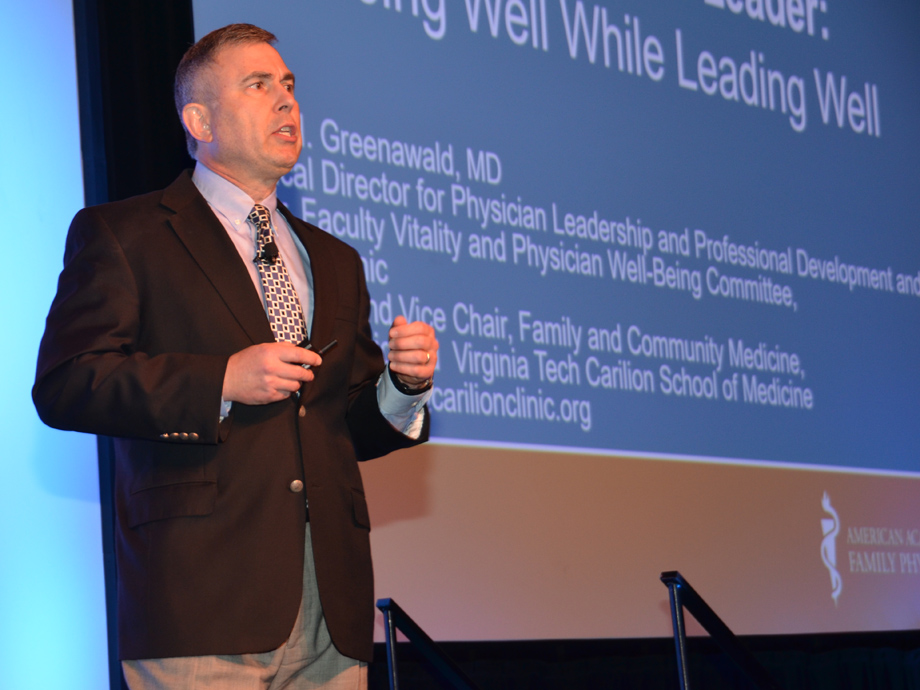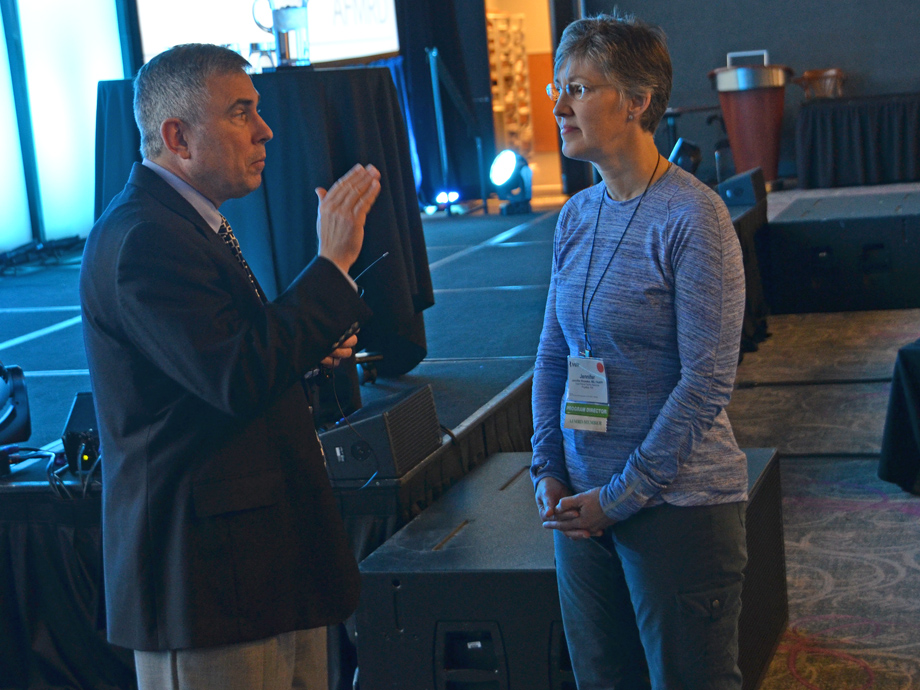AAFP 2018 Residency Education Symposium
Speaker Plants 'Seeds of Possibility' for True Well-being
March 28, 2018, 02:04 pm Sheri Porter Kansas City, Mo. – The AAFP recognizes physician well-being as a top priority for members, so it is no surprise that the topic was hot at the AAFP's 2018 Residency Education Symposium held here March 23-27.

Multiple sessions during the symposium, which blended the Program Directors Workshop and Residency Program Solutions (RPS), focused on physician burnout, including the RPS plenary -- the Thomas L. Stern, M.D., Memorial Lecture -- that was delivered by Mark Greenawald, M.D., of Roanoke, Va.
His presentation, "Calibrating the Leader: Being Well While Leading Well," grabbed the attention of a room full of family physicians and other health professionals. Greenawald, vice chair for academic affairs at the Carilion Clinic Department of Family and Community Medicine at the Virginia Tech Carilion School of Medicine in Roanoke, did not disappoint.
"I am hoping that I can help you begin to reframe in some ways the conversation that we're having around physician leadership and physician well-being," he began.
"I'm hoping to, in some ways, re-energize your spirits around the same issue. And I'm hoping to plant the seeds of possibility for you, for your practice, for your program and for your people in terms of what could be in the context of true well-being."
Greenawald asked for a show of hands in response to this question: "How many of you love your work?" A sea of arms went up, and he smiled.
STORY HIGHLIGHTS
"If we had your programs all here this morning, I'm wondering if we would have that same response?" he mused. "Statistically, we wouldn't."
Greenawald asked his audience to listen, learn and then go back to their programs and "work toward achieving a place where everyone at the program can respond, 'We love our work,' and you honestly believe that."
Greenawald began by naming what he called the "elephant in the exam room" -- the cumulative distress that physicians and their colleagues are going through "in the process of delivering high-quality, patient-centered family health care to our patients."
Even as physician well-being emerges as a national priority, not everyone has the same level of awareness. "We still have burnout doubters in our health care system. They still don't believe it's a thing," said Greenawald.
But many others recognize burnout, may have gone through it themselves, and want to make sure their colleagues don't have to go through the same process, he added.
Greenawald shared his map for a successful journey to well-being, focusing specifically on four action words:
- name the problem without shaming people who are crying out for help,
- claim it as our own in the health care system,
- frame it as a complex issue with a variety of solutions, and
- tame it by taking action.
FP Details His Burnout Journey
Mark Greenawald, M.D., recently spoke to a room full of family physicians about physician well-being at the AAFP's 2018 Residency Education Symposium. Read about Greenawald's personal experience with burnout and how he's using what he learned to help his colleagues -- and those they lead -- attain more balanced lives in this week's Family Doc Focus profile.
"We have to care for those providing the care in order to get where we want to go," in terms of providing quality health care in this country, said Greenawald.
He defined burnout as "the condition that results from the chronic inability to emotionally recover from the distress of work in downtime," and he acknowledged that he'd experienced it firsthand.
It is a "condition, not a diagnosis," he stressed, and added: "It's a chronic condition. Burnout is not something you will solve by a weekend at the spa."
How big is this problem? A 2014 survey published in the December 2015 issue of Mayo Clinic Proceedings showed that 54 percent of physicians around the country were at high risk for burnout; for family physicians, that was 63 percent, said Greenawald.
However, when people are challenged by something for which there are no easy answers, inaction is a common response. Physicians are just starting to talk about burnout, administrators have no idea what to do about it, "and our patients and our payers are, for the most part, blind to it," said Greenawald.

This is a big deal, he continued, because burned-out physicians provide burned-out care. "How can you provide five-out-of-five care if you're feeling like a one- or two-out-of-five clinician? It's not possible."
And that's why physician well-being and physician burnout have become quality, safety and risk management issues -- "and now an accreditation issue," said Greenawald.
He discussed the operational side of the burnout problem -- issues such as administrative hassles and technical challenges. But he said addressing operational barriers alone will never solve the burnout problem.
"You never 'efficiency' your way to thriving," said Greenawald.
He then laid out the other side of the equation -- the relational side that family physicians do so well. "It's how we connect, how we communicate, how we collaborate with each other; that's going to move us forward on this," he said.
"We also have to be anchored in the meaning of the work we do and the identity of who we are in doing that work," said Greenawald. "Meaning is the 'supercharger' for thriving."
Leaders need to provide practical solutions, said Greenawald, adding that his organization has built a four-part framework that consists of
- education and skills-building so physicians know that what they're experiencing is not normal;
- crisis management and prevention that include a place to ask for help that is safe and confidential;
- continuous improvement by asking physicians about the sources of distress in their daily work; and
- culture and connection that, in essence, ensure people have what they need to grow and thrive.
Greenawald said his health system created the "Fourth Aim Better Life Team," a committee charged with "keeping our feet to the fire," so whatever the problem -- be it the electronic health record system, prior authorizations or primitive keyboarding skills -- "our physicians knew we were on it so they could do what they do best, which is see patients."
Improved physician burnout survey scores show the effort is working.
Greenawald shared his vision about physicians regularly partnering with each other one-on-one in the context of support, much like the buddy system in the summer camp swimming pool of his youth.
"What happens with that buddy when the lifeguard blows the whistle? You have buddy check. You go to the side of the pool, grab your buddy's hand and you raise it up and say, 'We're still alive.'"
What would it look like, Greenawald mused, "if we had national buddy checks going on regularly?" He answered his own question, saying the rate of distress and burnout would begin to dissipate rapidly because of those personal connections.
Don't be afraid to ask your colleagues how they are doing emotionally, urged Greenawald.
Physicians must remember that even though their relationships with their patients are important, their relationships with colleagues are equally valuable.
"It's my colleagues who will be uplifting me on a daily basis. It's my colleagues who are going to be checking in with me on a daily basis and asking, 'How are you doing?' and not let me off the hook when I say, 'I'm fine, I'm fine.'"
Physicians also need to prioritize their time with loved ones and their own self-care, he added.
"The goal at the end of the day is not just survival. The goal is not just to grind this out to that fantasy place called retirement," said Greenawald. The goal is to thrive, and to experience meaning, fulfillment and connection in work.